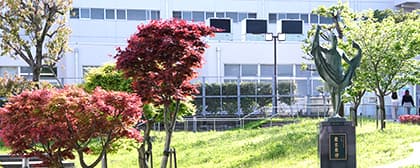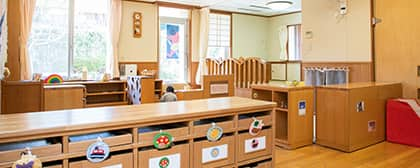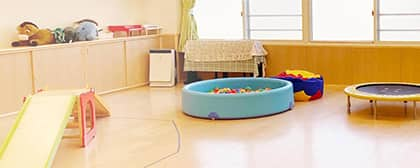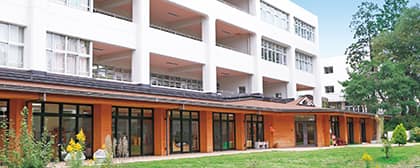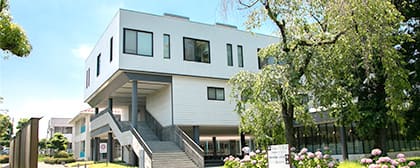Undergraduate
Tokyo Kasei University’s six faculties and thirteen departments train specialists to support a variety of life stages. Through lectures by faculty members who are at the forefront of their respective fields of specialization as well as practical activities and exercises, we train students to deepen their professional expertise to be able to play a central role in their chosen fields. We aim to foster an environment where students can cultivate the mindset and creativity necessary to support and assist in enriching people’s everyday lives.

− Itabashi Campus −
Home Economics
The Faculty of Home Economics is composed of three departments: the Department of Costume and Clothing Science, the Department of Environmental & Symbiotic Sciences, and the Department of Art and Design. Since Home Economics is a discipline that is rooted in people’s daily experience, we aim to cultivate individuals who will value learning that combines both knowledge with practical training, helping them become specialists in their chosen fields.
-
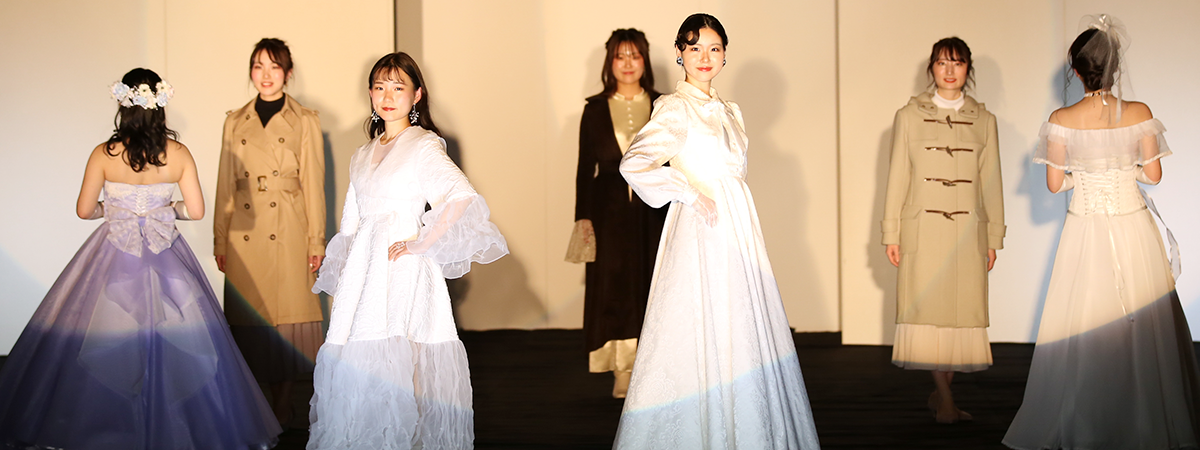
The Department of Costume and Clothing has its own rich history and traditions. Despite an educational core based in the founding spirit of self-reliance, self-control, and the living doctrines of love, diligence, and wisdom, it also intends to nurture students as future professionals with the power to lead to the creation of new values and who contribute to society.
Through their course work, students study apparel from the perspectives of both science and fashion. This comprehensive approach allows students to find success in the fields of both fashion and education. Students learn a wide array of knowledge and techniques, including the ability to examine fashion. Their learning is deepened further still in the discovery of their own aptitudes, and we offer guidance that can help them find their own course in life. This instruction and support ensures that students are able to progress towards realizing their future plans and earning a variety of career qualifications, including Home Economics teacher, Textiles Advisor (TA), Curator, or Textiles Evaluation Specialist (TES).
-
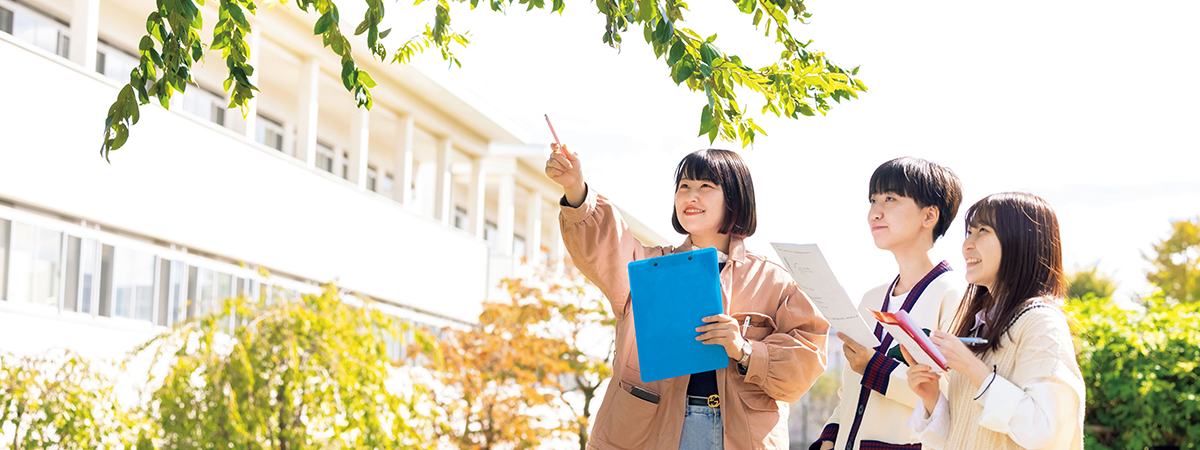
The Department of Environmental & Symbiotic Sciences offers an educational experience wherein students may acquire a foundation of basic knowledge and carry out the experiments, training, and lab seminars necessary to gain practical understanding of theoretical principles. During their course of study, students clarify their educational and professional goals and are then able to focus on courses that will help them succeed in their intended careers.
The experiments, training, and lab seminars in our curriculum have been put together as a systematic whole rather than in piecemeal fashion. Courses involve fieldwork, including water surveys and hands-on farm experience, with elective outdoor training on Iriomote Island in Japan, as well as opportunities for practical training overseas. By working through the courses, our students can give serious thought to how their studies can best lead to future careers as science educators or in related occupations, such as environmental planners. The department’s goal is to train students as professionals who can understand the various problems inherent in the environmental issues in our day-to-day lives and who will be able to consider solutions by studying these problems from the perspective of nature and the environment.
-
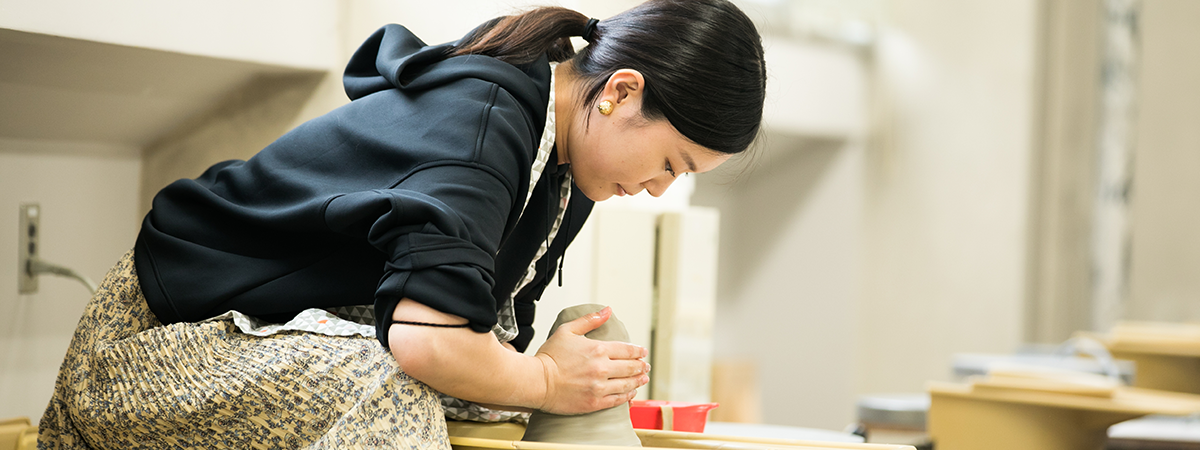
Our department trains students to have strong minds and sensibilities, and develops professionals who will create comfortable and beautiful living spaces.
A curriculum that begins with the basics, providing the opportunity to learn the overall skills for art and design
Students are not expected to choose their specialization at the time of enrollment, but rather to find their own direction by spending the first year learning basic practical and theoretical subjects such as practical foundations, sketching, color science, basic modeling, and art history.
Students take subjects that serve as the introduction to their specialization in their second year.
A flexible open curriculum allows students to select from a variety of specialized courses
Choosing freely from among various specializations in their third year and learning the most appropriate mode of expression allows students to pursue the possibility of self-expression through artistic modeling.
The fourth year is divided into various seminars, and students begin work on a graduation project.
Producing art on a verdant campus with extensive studio facilities
Our students practice their creative activities on a campus lush with abundant greenery.
Extensive studio facilities have been provided for each artistic specialization.
Nutrition
The Faculty of Nutrition is composed of two departments: the Department of Food Science and Nutrition and the Department of Nutrition and Dietetics.
The Faculty of Nutrition provides students with a wide range of specialized knowledge and practical skills related to food and health. We believe dietitians and nutritionists play a vital role in the society, and therefore, we aim to cultivate individuals who are dedicated to improving the nutrition and the health of members of the society.
-

The Department of Food Science and Nutrition is for those who wish to learn nutrition comprehensively, aspiring to pursue careers in one of a variety of fields associated with health and the human diet. Students can learn about the mechanisms of the human body, the impact of nutrition on health, and the importance of food product components. In addition, students are given the opportunity to study about food processing, storage methods, ingredient selection methods, and the components of food.
Students in the department can obtain various qualifications depending on the courses they take. Such as: Nutritionist’s License, Middle and High School Teaching License (Home Economics, Nutrition, and Science), qualifications for appointment as a Food Sanitation Inspector or Food Sanitation Supervisor, or an eligibility to take the Food Specialist Examination and the National Examination for Registered Dietitians.
-
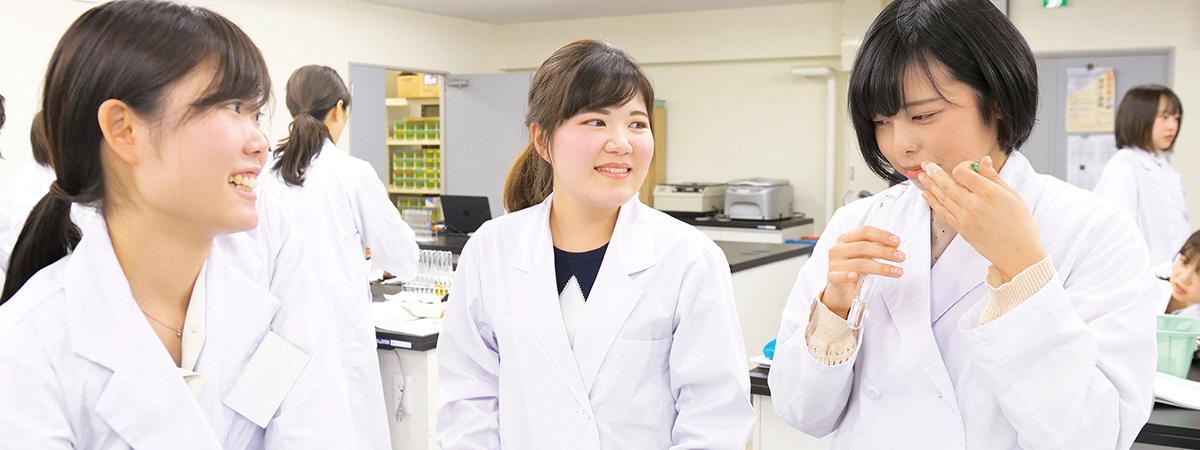
Graduates of Department of Nutrition and Dietetics often pursue the role of nutrition experts as part of a team-based approach to medical care. We aim to foster experts who can comprehensively manage the creation, implementation, and evaluation of a nutrition education and dietary therapy program that considers the pathologies and mechanisms of the human body and the realities of medical care in practice.
Students in the department can obtain various qualifications depending on the courses they have taken, such as a Nutritionist’s License, Middle and High School Teaching License (Home Economics, Nutrition, and Science), qualifications for appointment as a Food Sanitation Inspector or Food Sanitation Supervisor, or an eligibility to take the Food Specialist Examination and the National Examination for Registered Dietitians.
Child Education and Care
Today, nursery schools, kindergartens, and elementary schools are required to work together to carefully engage in the development of every child. At the Tokyo Kasei University's Department of Child Education and Care, students can acquire new knowledge and skills needed regards to children’s education and care. The Department, ‘Jidou-gaku,’ has 60 years long tradition of being a pioneer in this field.
The Child Education and Care major aims to develop specialists in childcare, while the Childcare Support major equips individuals to become specialists in childcare support. In the Elementary Education major, students learn about various aspects of elementary education. We believe this stage of education is important because it can open the way to a solid future for every child. Our program is designed so that students can gain specialized expertise, while having a broader perspective, so that they can comprehensively think and create a brighter future for the children.
-
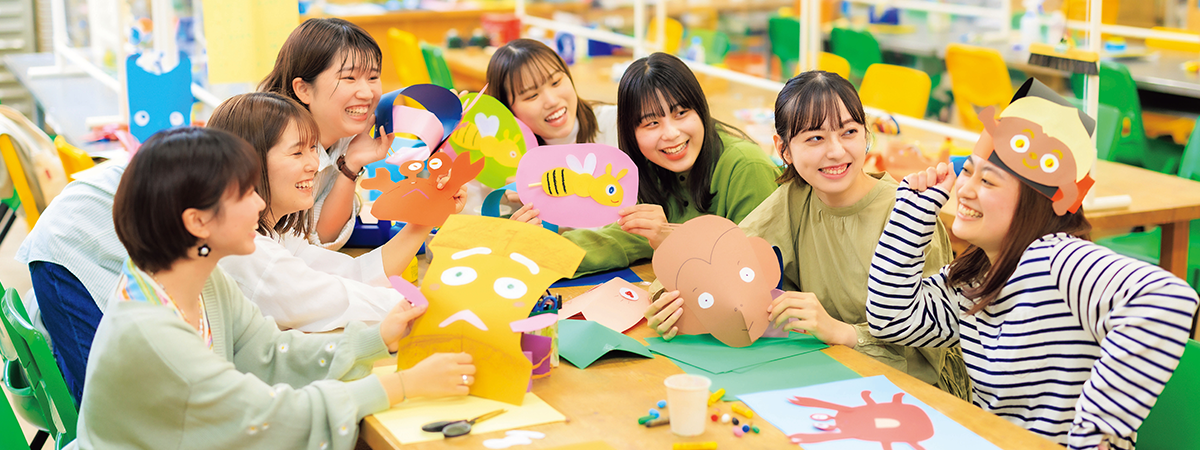
Focusing primarily on pre-school-aged children, the Department of Child Education and Care takes a comprehensive and multi-faceted approach to the study of children and adolescents up to the age of 18. Students train for professional careers in which they can continue to explore the study of early childhood education. After completing the program, students will earn the first category teacher's license for Kindergarten or Nursery School.
Early childhood education is more needed than ever as diverse needs for childcare has increased. For this reason, the Department of Child Education and Care has established Child Education and Care Major and Childcare Support Major to train and develop kindergarten, nursery school teachers, and other childcare experts. The program is designed so that students can become specialists who will develop childcare strategies based on a keen understanding of the needs of each individual child and create partnerships with parents and the community.
Moreover, our campus is fully equipped with a number of childhood education facilities, including a campus kindergarten, a nursery room, a facility for children with disabilities (the Wakakusa Group), and our Parenting Plaza (Kosodate Hiroba). These facilities allow students to learn in an atmosphere where they gain hands-on experience with children and parents, and the realities of childcare on campus.
-
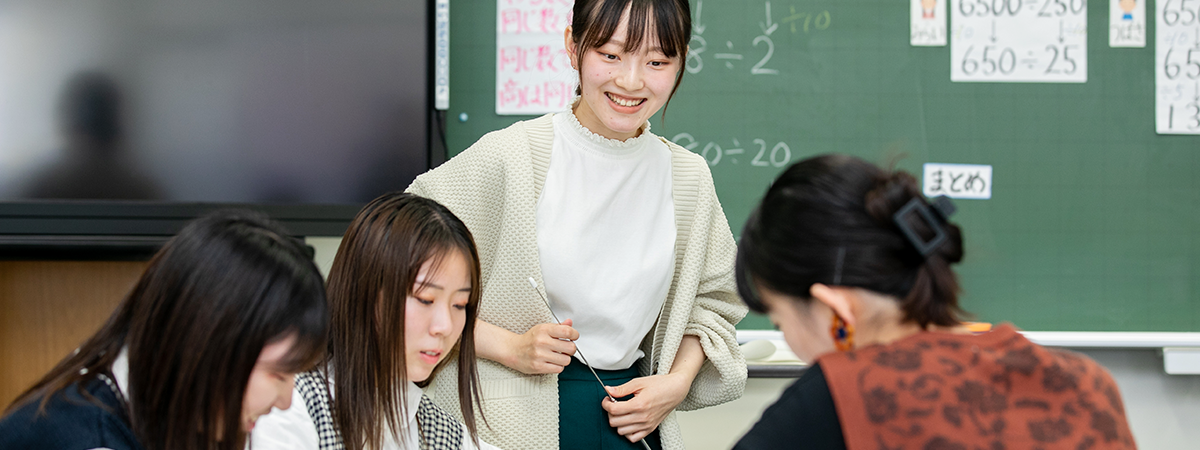
The Department of Elementary Education was established in 2009 to train teachers to meet a variety of needs as well as to enhance their professionalism as elementary school educators. Our core concepts are to train educators who will be able to:
- (1) Provide instruction that will allow children to learn basic academic skills (such as language and arithmetic)
- (2) Manage classrooms with confidence and prevent the breakdown of classroom order
- (3) Offer special needs education by providing for the needs of children with disabilities in regular classrooms
- (4) Provide learning and growth support based on a long—term view of children’s development
- (5) Provide instruction in English-language education at the elementary school level
Every year, about 60% of our department’s graduates become elementary school teachers, 20% become kindergarten teachers, and the remaining 20% become civil servants, career-track employees, or proceed to graduate schools.
Humanities
The Faculty of Humanities consists of the Department of English Communication, the Department of Psychological Counseling, and the Department of Social Education and Welfare, each of which has its own distinct characteristics. A watchword shared by these three departments is “respect for diversity.”
The Department of English Communication addresses the theme of communication with people from linguistic, cultural, historical, and religious traditions distinct from Japan. The Department of Psychological Counseling deals with a variety of psychological conditions, including mental problems such as depression, bullying, and school refusal. Finally, the Department of Social Education and Welfare considers the lifestyles of people facing various difficulties such as disability, poverty, and abuse, and possibilities for education that transcends generational boundaries.
In each department, our aim is to learn about, engage with, and come to a mutual understanding of the existence of others.
The topics addressed by these three departments are key issues for contemporary Japanese society, as well as essential considerations for living in a global era. At the Faculty of Humanities, our aim is to train human resources who will be able to think for themselves about what they can do in society and then put this into practice.
-
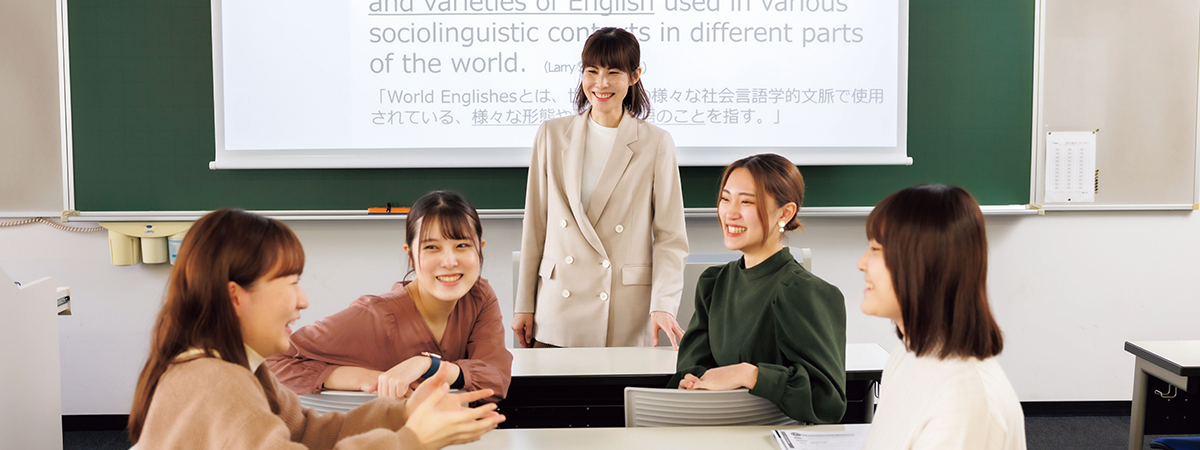
The department seeks to help students cultivate English-language communication proficiency that will help them be successful in this age of internationalization. By studying British and American literature, English linguistics, and English language education students will develop a broad-based view of language.
Specifically, the department features intensive English courses for language enhancement, overseas studies at our partner universities, attentive instruction in small groups, and an English curriculum to prepare students to find employment. Through classes that make use of these features, we work to improve the English-language proficiency of each student. The Department of English Communication seeks applications from people with an interest in the English language, English-language literature and arts, cross-cultural communication, foreign-language education, and global cultures and languages, as well as those who wish to make their mark in international society and are attempting to improve their proficiency in English or other foreign languages in order to clear the path to their own future.
-
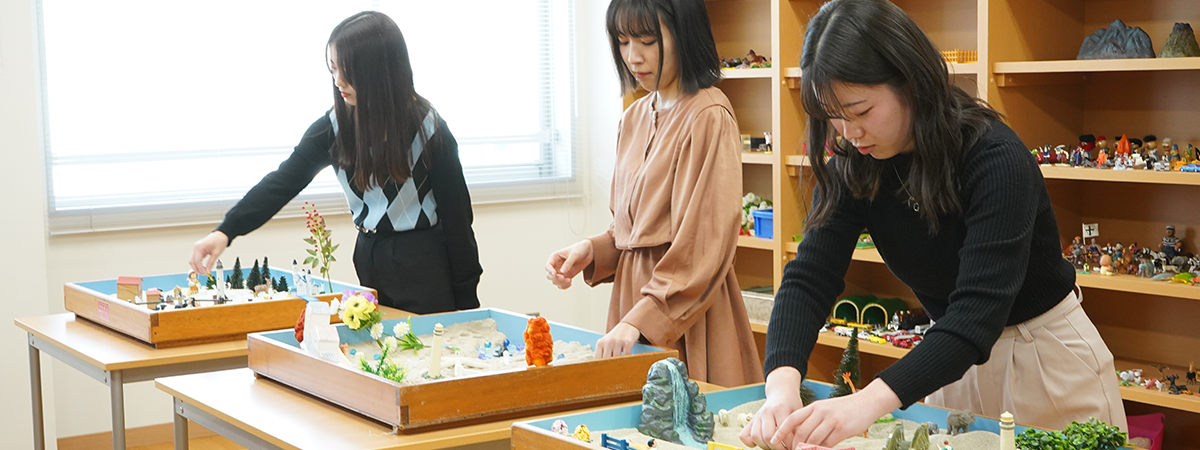
Our department seeks to cultivate individuals who will learn extensively about the study of psychology and associated areas, as well as interpersonal skills, from the basics to application, and who will be able to bring a counseling mindset to their personal interactions. For this reason, this specialization emphasizes experiential learning that incorporates a variety of exercises and practical training. Moreover, a special feature of this department is the training of nursing teachers able to provide emotional support (kokoro no kea) based on this foundation. Also, in order to train our students to be professionals with the high degree of expertise and practical ability that enables them to be active in various fields such as medicine, industry, and education, a path has been opened for advanced study at the university’s graduate school. In several of our subjects, we have set up a system that provides a continuous educational experience for six years. Since the university’s graduate school is designated as a Type 1 graduate school for training clinical psychologists, our graduates are eligible to take the Clinical Psychologist Certification Examination upon completion of their course of study.
-
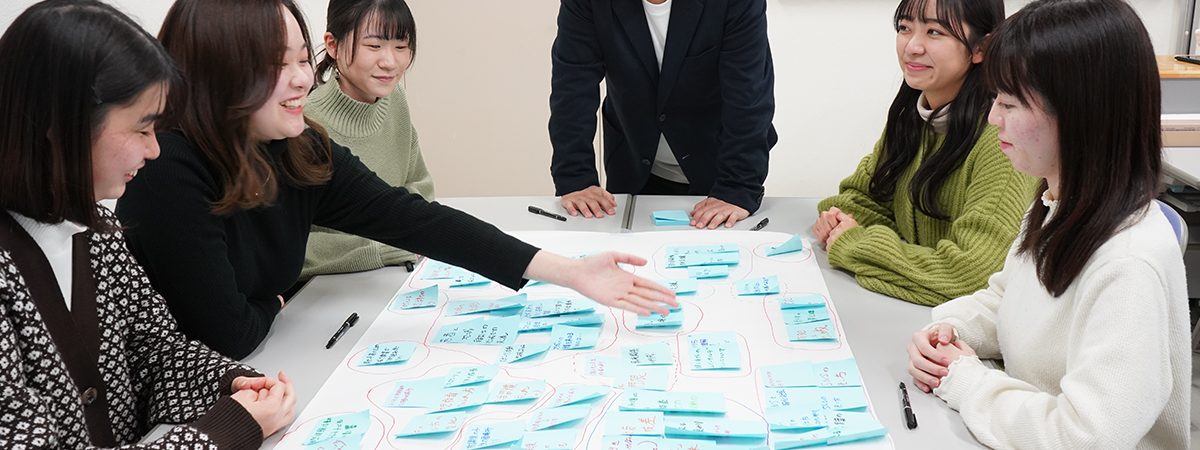
The Department of Social Education and Welfare seeks to train students to become professionals who will provide support by becoming closely involved with people’s lives in society. While social welfare connotes the image of helping the weak, this is an outdated mindset. In our contemporary society, social welfare seeks to bring about the realization of a society in which everyone is able to lead happy and fulfilling lives. In this department, we train professionals from the three perspectives of social education, social welfare, and psychology in order to provide social support to help people lead active lives or in response to a variety of incidents that could impact peoples’ lives or lifestyles—for example, disability, disease, divorce, or economic difficulty. To achieve these objectives, teamwork is indispensable. In addition to professional knowledge and practical skills, we focus on extensive training to build and adjust interpersonal relationships as well as the training of professionals equipped with a human touch. Each year we provide education to small groups of around 70 students who go on to find employment in social welfare professions as well as in other fields.
− Sayama Campus −
Health Sciences
There are two departments in the Faculty of Health Sciences, namely the Department of Nursing and the Department of Rehabilitation.
In the Department of Nursing, we train human resources who will acquire advanced knowledge, skills, and attitudes as nursing professionals to be able to provide ongoing support that will enable people to live in the way that they want through the process from birth to old age and peaceful death.
Over four years of study, we will train professionals who will acquire the professional knowledge, skills, sensibilities, and meticulous attention to detail so that they be able to practice nursing and rehabilitation services to support people “living their own lives in the way that they want.”
-

The Department of Nursing trains human resources who will be able to contribute to maintaining and improving people’s health and quality of life at all ages.
In order to maintain and improve health and to sustain quality of life from birth into old age in order that people are able to live in the manner of their choosing, we have established lectures, exercises, and practical training courses in each year of study so that students will be able to contribute to the development and improvement of healthcare and welfare as professionals with a well-rounded humanity and philosophy of respect for life and the dignity of character, as well as high-quality practical nursing skills capable of responding to the needs of society.
- The Department of Nursing has six defining characteristics:
- (1) Cultivation of a desire to inquire more deeply into the nature of nursing
- (2) Nursing education that emphasize “nursing that sees ‘human beings’ and nurses ‘human beings.’”
- (3) Nursing practice that supports “living” in the way they that they want
- (4) Education and training programs that improve knowledge and skills of “emergency nursing methods” and “disaster nursing.”
- (5) Collaborative education with the Department of Rehabilitation
- (6) Educational environments that support the integration of lifestyles with medicine and nursing care
-

In the Department of Rehabilitation, we train (1) human resources with the skills necessary for offering high-quality rehabilitation services that can respond to social needs based in a well-rounded humanity, respect for life, and dignity of character; (2) human resources with the ability to work together as members of a team; and (3) human resources with specialized knowledge, skills, attitudes, and independent learning abilities backed by the scientific grounding demanded by professional vocational education.
- The Department of Rehabilitation has five defining characteristics:
- (1) Education in the field of pediatric rehabilitation
- (2) Collaborative education with the Department of Nursing
- (3) Strong cooperation with local communities
- (4) Subjects that incorporate advances in medical treatment
- (5) Full use of training equipment
Child Development
For many years, Tokyo Kasei University produced graduates who became kindergarten and nursery school teachers, and many of its alumni are active in the field of child education.
On the basis of this history and tradition, the Faculty of Child Development was created with the aim of training nursery school teachers capable of bringing out the potential of all children, including those who require special support. We train individuals who can offer professional services to children in need of support, such as those with allergic conditions or developmental disabilities. Our graduates also possess skills in areas such as health, medical care, and school-based special needs education.
Another strength of the Faculty of Child Development is the ability of its graduates to acquire the qualifications and licenses necessary to become nursery school, kindergarten, or special education teachers.
-

At the Department of Education for Childcare, students are able to gain a holistic view of children’s existence and acquire the support-related knowledge and skills necessary to help both healthy children and those who are in need of special support to overcome cultural and national differences and any other hindrances in order to realize their own intrinsic potential. In a practical childcare environment where local children can enjoy playing and living in natural surroundings, students will study over four years working together with full-time staff and peers aspiring to the same goal.
- The Department of Education for Childcare has three defining characteristics.
- (1) Fostering childcare professionals able to practice appropriate childcare for a variety of children within the three subject groupings of the “Health and Childcare Stream,” “Special Needs Education Stream,” and “Childhood Arts and Culture Stream”
- (2) The parallel establishment of a nursery school and pediatric clinic on campus
- (3) Invitations to external lecturers to hold workshops


